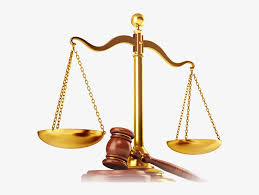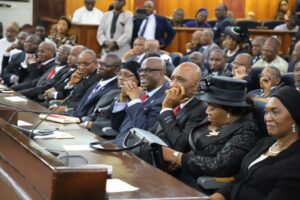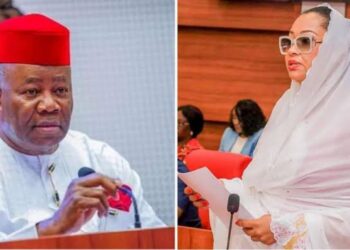

Below are extracts from the 80page judgement of the Court of Appeal on the 11year old trial of the former governor of Ogun State, Otunba Gbenga Daniel by the Economic and Financial Crimes Commission (EFCC),a Nigerian law enforcement agency that investigates financial crimes such as advance fee fraud and money laundering in the interest of the Federal Government.
CA/IB/264C/2021
OTUNBA JUSTUS OLUGBENGA DANIEL
VS
FEDERAL REPUBLIC OF NIGERIA.

The defendant Otunba Gbenga Daniel was arraigned in court on the 11th of October 2011, on a 16 count charge which was amended at various times and the final charge (4th amended Charge) had a total of 32 counts, In the course of the trial the EFCC called about 35 witnesses and tendered over 1000 documents as exhibits, at the close of the prosecution’s case, the Defense Team filed a NO CASE SUBMISSION to the effect that the EFCC had no case against the defendant and that there was no evidence of wrong doing to prove an essential element in the alleged offence , even from the evidence of the prosecution it was apparent the Prosecution’s case was fraught with manifest contradictions and not a single offence had been proved before the trial court. The case of the prosecution has been so discredited during cross-examination, and has made their whole Witnesses manifestly unreliable.
The court upon listening to the submission ruled that the NO CASE SUBMISSION succeeds in part and dismissed 15 of the counts and asked the defendant to enter a defence for the 17 remaining counts.
Not satisfied with the ruling of the high court the Defendant was left with no further option than to appeal to the Court of Appeal sitting in the ancient city of Ibadan.
Upon hearing of the appeal, the Court of Appeal on the 12th of Appeal 2022, the three (3)- Man panel Unanimously ruled that the Appellant’s arguments in the NO CASE SUBMISSION were proper and correct and they upheld the appeal on the NO CASE SUBMISSION and struck out the remaining 17 counts of the charge.
Yargata Nimpar JCA held as follows amongst the other numerous holdings that;
From the resolution of issues put before the Justices of the Appeal court.
1. On the issue of Jurisdiction of the court: Why would a court opine that it is inappropriate at any stage of the proceedings to raise the issue of Jurisdiction? *“Convenience of the court is never a consideration in determination of jurisdiction”* a no case submission is part of proceedings in a criminal trial and it is settled that all offences must have been created in a valid and subsisting law and it is more imperative for a court to be sure of its power to try the offence that is created by a written law, as constitutionally provided for. The court below therefore erred by designating appropriate times an objection on jurisdiction can be spelt out. Since the apex court gave an open cheque in making such applications, no court below the Supreme Court has the vires to limit or state otherwise. *Jurisdiction is too important to be compartmentalized by designating times it can be raised. It is likened to red hot iron ball that the moment you touch it, It must be dropped or else your hands get burnt. Once jurisdiction is challenged, the court must drop everything it is doing to determine whether it has the jurisdiction before proceedings or taking its hands off the matter*.
2. On Whether a crime or an offence can arise from infractions in the land use Act: *“Even if there was an offence with regards to land administration, the fraudulent element had no evidence supporting it, the trial judge did not identify the evidence which established the fraudulent element.”*
A. One of the powers of the governor is to allocate land to any person and there is nothing therein that says he cannot allocate land to family members and artificial persons (companies or churches), other persons who are citizens of Nigeria and the same applies to his friends and by extension himself. Just like any trust, deviation from the powers bestowed would create a breach but it may not necessarily be an offence. *“In this case there is nothing that was done outside the powers of the Governor, the land use act did not criminalize any act of the governor under the powers bestowed on him or generally in the said act”*
B. The land use act allows the governor to allocate land for all purposes, how then can the respondent define unlawful purposes? What would be the authority for such distinction when *“ALL PURPOSES” should mean “ALL PURPOSES”*.
C. *It looks like the Respondent is fishing for offences related to land administration in Ogun State laws*.
D. *Allocation of land through the normal process can not be fraudulent, having failed to show that the governor, his family members and friends are not Nigerians and not entitled to any allocation of land in ogun State or be beneficiaries, no offence can be inputed, the powers of the governor were not breached, and no criminal offence was created with regards to the powers of the Governor to allocate land to any Nigerian*.
E. *When it comes to applicability of section 36(12) of the constitution, the land use act did not create an offence that the respondent can arraign the appellant for, the trust created did not provide that the governor can not allocate land, in fact allocation of land is one of the powers of the governor*.
F. *The respondent failed to proffer any evidence of a fraudulent intention or to satisfy the ingredient it named in its brief, I also say the respondent failed to present evidence that can prove elements of the offence upon which the appellant should be called upon to defend*.
G. *I also disagree with the learned trial judge that a prima facie case was made in respect of the counts listed in this issue. The easiest way to determine whether a prima facie case was established, is to identify the witnesses who testified to each element of the offence, that way it becomes clear where no evidence was presented in respect of an element of the offence and the trial judge can easily determine which count the defendant should be called upon to put in his defence and the one not made out. General consideration blurs the determination of a prima facie case particularly when the counts are these numerous and some so closely related that finding a distinction becomes a daunting task for the trial court. Also tying of witnesses to the elements helps the appellate court to also at a glance resolve the question whether a prima facie case was made out*.
3. *On Fraudulent Conversion of Land, for purposes not authorized by the land use act: The land use act by section 2 and 5 says the Governor can allocate land for all purposes, what then is the purpose (outside all purposes) that the respondent can deduce from all purposes in order to create an unlawful purpose. All the acts complained against are not offences but within the powers of the governor, there may be some unethical practices but such actions are not offences and if there were unlawful revocations and compulsory acquisitions done with the approval of the appellant, the same land use act gave jurisdiction to the High Court to determine the lawfulness of such actions. certainly not in the realm of a crime because the land use act did not criminalize any action or power under it*.
A. *The respondent’s argument raise more of a moral question and not criminal issues. WHAT IS AN OFFENCE CAN NOT BE DEFENDED, the land use act did not specify the purposes not authorized in land allocation, so how can the issue of trust create an offence from what the law did not create. As observed earlier there can not be a hybrid of a state legislation latching a federal law to create an imaginary offence*.
4. *Whether the appellant can open defence for declarations made in Abuja: In establishing the offence under section 27(3) (b) EFCC Act, the prosecution is under a duty to present evidence of knowledge in the making of a false declaration, this brings in the need for evidence of the fraudulent intention or mens rea as required by law. Black’s Law Dictionary defined knowing as follows “having or showing awareness or understanding; well informed deliberate conscious, a knowing attempt to commit fraud knowingly”*
*To show that it is done with the consciousness or awareness that it was false, it will require evidence from the respondent that the appellant had reason to believe the declaration false and he did so with a fraudulent intention. The only witness who attempted to do so failed, so it was not established b y evidence, it was only PW 20 who told the court below that he believed that the appellant was not being truthful, his belief was not back by evidence*.
A. *The respondents urged the court to lift the veil to know if truly the appellant had interest in those companies, where evidence does not show direct link, particularly from a search conducted in Corporate Affairs Commission by the respondent and the evidence tendered during the case for the prosecution. The respondent cannot at this stage ask that the veil be lifted to know the interest of the appellant. Once the link is not evident, the interest too remote and weak to come under this section and to create an offence. This is because it was not shown that he is managing the companies so as to know the investments done in other companies, it will be remote to ascribe to the appellant interest in the 2nd degree company since the investment was done by an artificial person and not the appellant*.
5. *On Corrupt Enrichment of receiving some sums from Aron Nigeria Ltd: The court below discharged the appellant on counts 17-24 relating to corrupt enrichment of receiving sums from Aron Nigeria Ltd for the benefit of two other companies contrary to Section 19 of the Corrupt Practices and related offences Act, but sustained counts 25 and 26 which relied on same evidence that got the appellant off on counts 17-24, counts 25 and 26 allege corruptly obtaining property contrary to Section 10 of the corrupt practices and related offences act, the respondent argued that they are different offences*.
A. *Courts have often times admonished prosecuting agencies to focus on offences that the evidence can establish and not just craft charges that appear on the surface without evidential backing to prove same, it amounts to fishing for offences, the argument of the respondent is mere semantics without any difference, corruptly obtaining and corrupt enrichment has an imaginary distinction and not a substantial difference, there was nothing new in the evidence, the same sum of money involved, the same companies and the same evidence but different counts. It looks like the prosecution was not sure of which of the offences its evidence can prove so it is more of a gamble instead of a conscious decision to target a definite allegation. The evidence of the prosecution witnesses obviously was insufficient, because the trial judge observed that the sufficiency issue is a matter for trial. The definition of a prima facie adopted earlier includes the demand that if the evidence of the prosecution is believed as it stands, it could lead to a conviction*.
B.*The evidence here is certainly insufficient and there is no opportunity again for the respondent to bring additional evidence in order to prove any allegation after the close of its case*.
C. *The lower court had found that the evidence of PW 32 negates the allegation against the appellant in counts 17-24, that the appellant did not use his office or position of governor to corruptly influence the award of contract in respect of the sum of N32 Million and N29 Million, so if there was no corrupt influence with regards to the award of the contract, how can he now be guilty of obtaining property unjustly and connected to the same contract when there was no influence and was not said that used the position to confer undue advantage*.
D. *The moment the lower court acquitted the appellants on counts 17 and 19, these ones too failed because it is the same contract and parties. Prima facie case cannot be established for count 25 and 26 with the evidence of PW32 who totally demolished the case of the prosecution. The evidence of PW32 before the court was that there was no influence and the money paid to the two companies was for sub-contracts executed by the companies and it was strictly for services rendered, this destroyed the case of the respondent because it has removed the offensive element in respect of the alleged offences. The companies are artificial persons functioning in the line of business for which they were paid*.
6. *On whether the Appellant should enter defence on the allegation of stealing government funds: The allegations that as governor the appellant converted government money in the aggregate sum of N55 Million, N19.998 Million, N48 Million, N10 Million, and N60 Million to the use of a company Blue Chapel Limited, Kresta Laurel Limited and Western Publishing Limited. The appellant referred the court to the evidence of PW22, PW24, PW25, Pw27 and PW29, while the respondent relied on the evidence of PW23, PW25, PW30 to contend that there was evidence in respect of all the elements of the offence of stealing*.
A. *The settled rule is that there has to be evidence in respect of all the ingredients because if there is any without evidence then the entire count fails. I have reviewed the evidence of all witnesses relied upon by both sides and what comes out very clear is that various payments were made for various reasons, even the sums paid to the appellants account officer passed through normal approval channels and disbursements. Going by the element, stealing required to have evidence in support, I find the fraudulent element missing. Nothing was done in secret without relevant approvals, for the appellant’s entitlement, the prosecution did not show that he was collecting more that he should so as to presume fraud. The funds were not in the appellants physical or constructive possession and he did not approve all payment, not a single payment was made contrary to law or without approval or budgeted for. Fraudulent conversion is without evidence to support it in calling on the appellant to enter his defence, Further more the intent to permanently deprive the owner of the funds were not mentioned by all the witnesses relied upon and unless there is evidence in that regard, the no case submission should succeed*.
Conclusion by the Court.
All the court is required to do when a no case submission is made is to determine whether the evidence adduced by the prosecution is sufficient to warrant an explanation from the accused person.
*When the respondent did not present evidence in support of ALL the elements, the NO case submission should succeed, furthermore, where the evidence of the prosecution is “contradictory on any ingredient of a count, the No case submission should succeed, In this appeal, “some of the counts did contradict the evidence in support”, “some of the evidence could not cover all the ingredients and for some counts the court erred because they are not offences known to law”*
*The Supreme court in Abacha V. State (2002) LPELR-15(SC) admonished in the following words “the courts have inherent powers to prevent abuse of their process by any of the parties whether plaintiff or defendant, prosecution or defence, so that as long as democratic process exists nobody will have his rights curtailed. All power to settle issues between the parties is vested in courts and court must be vigilant that genuine issues and controversies are settled so that no accused person will be settled either directly or indirectly through act or prosecution; if not we shall have persecution in place of prosecution. It is for this reason that an accused person despite the power to file indictment on an information should not be indicted to face trial that from the onset it was clear that he should not face*.
In the light of the resolution of all except one of the issues donated for determination, the appeal is meritorious and is allowed, the ruling of the trial court in criminal case No. AB/EFCC/1/2012 -BETWEEN FEDERAL REPUBLIC OF NIGERIA V OTUNBA JUSTUS OLUGBENGA DANIEL delivered on the 17th May, 2019 wherein the appellant was ordered to enter his defence in respect of Counts 1,2,3,5,6,12,14,15,16,25,26,27,28,29,30,31 and 32 of the information is hereby set aside. The appellant is discharged on these counts of the information, the entire information has failed and there is no surviving count of the information sheet.
Folashade Ayodeji Ojo JCA; amongst other things held as follows “in the final analysis, *it is apparent the respondent failed to make a prima facie case of stealing against the appellants, the trial court thus erred when it failed to uphold the submission of the appellant contained in counts 27-32. My learned brother has given a detailed analysis of why the trial court should have sustained the no case submission made on behalf of the appellant on all counts of the information. I agree with him in toto that there is merit in this appeal and I join him in allowing it”*.
Abba Bello Mohammed JCA; held as follows *“I had the privilege of reading the draft of the lead judgment just delivered by my learned brother Yargata Byenchit Nimpar JCA, I agree that this appeal is meritorious for all reasons and conclusions stated therein, which I fully adopt as mine.
I also hold that the trial judge was wrong to have called upon the appellant to enter his defence when there is no evidence on the record that the prosecution had made out a prima facie case on any of those counts for which the appellant was ordered to enter his defence. It is only when the prosecution has made out a prima facie case by establishing with credible evidence all ingredients of the offences for which the defendant is charged that a defendant will be required to enter his defence*.
*It needs to be stressed that the prosecution of criminal offenses is not a fishing expedition. It is to be embarked only when criminal offences legally so defined have been committed, and there is sufficient evidence to justify prosecution of a defendant for such offenses. Embarking on prosecutorial fishery for non existent offenses or in the absence of necessary or sufficient evidence can only waste valuable time, waste scarce resources, lower public confidence in the responsible public institutions and subject hitherto innocent defendants to unnecessary and avoidable rigors of criminal litigation*.
*What is apparent in this appeal is that the defendant was subjected to prosecution for non-existent offences and for offences for which there was clearly no evidence to substantiate. While lamenting this situation, I join in allowing this appeal and in discharging the defendant, in total concurrence with all the detailed reasoning and conclusions contained in the lead judgment of my learned brother Nimpar, JCA*.
Going by this judgement, it is clear that the trial of Otunba Gbenga Daniel, is an ill motivated persecution of the innocent to say the least.With EFCC’s 35 prosecution witnesses, over 1,000 exhibits, 4 amendments of information, over 100 court appearances and over 11 years post service prosecution is it not strange that the final 32 counts have nothing to do with the original 16 counts?.
In a country where media trials have strength and damage character of the innocent as Nigerians are quick to conclude that all politicians are thieves, from the original sensational allegations which claimed about N60b was stolen by Otunba Daniel, which was later discovered by EFCC themselves as phoney yet our shameless EFCC wants to go to the Supreme Court because they cannot imagine such a disgrace after hunting him for 11years on mere allegations not minding what the trial must have cost the man whose service to the nation have in the last decade been limited because of a wild goose chase while real rogues are roaming the streets and even enjoying government patronages and are vying for electoral positions with loots stolen from our common wealth.
While it is allowed to pursue cases to the Supreme court level,on the strength of evidences and conviction, can EFCC come out open and tell Nigerians what they failed to present during the over 11years of the trial?. Is it not annoying that rather seek ways to compensate an innocent man whose life and reputation was also put on trial for over 11years?
This is pure persecution not prosecution. Kudos to the JCA, the common man can still have hope in the judiciary.Nigeria we hail thee.









